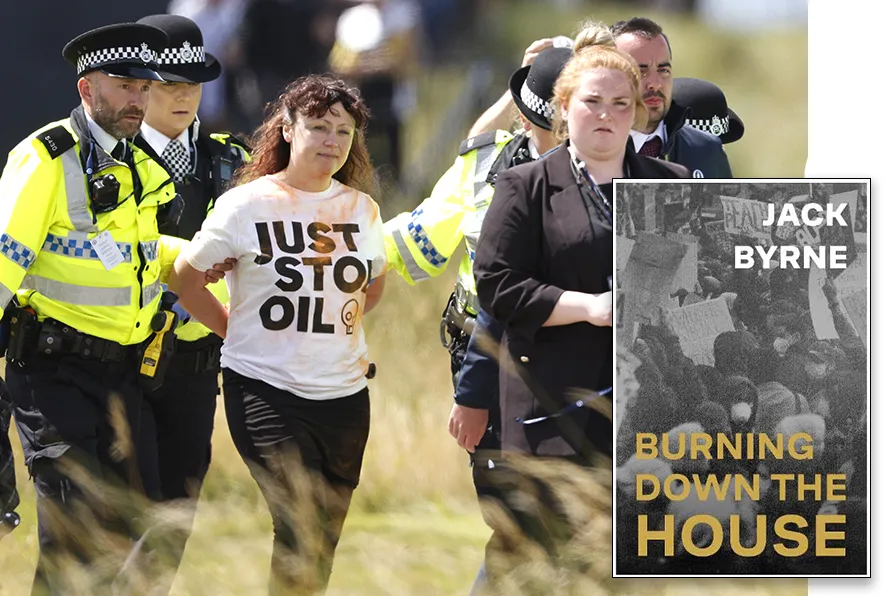Releases from Rahsaan Roland Kirk, Maggie Nicols/Robert Mitchell/Alya Al Sultani, and Gordon Beck Trio and Quintet
This thriller is a politically charged and morally complex dive into climate activism and police repression, judges JENNY FARRELL

 A Just Stop Oil protester is taken away by Police during day two of The Open at Royal Liverpool, Wirral, July 21, 2023
A Just Stop Oil protester is taken away by Police during day two of The Open at Royal Liverpool, Wirral, July 21, 2023
Burning Down the House
Jack Byrne, Northodox Press, £9.99
LITERATURE often offers perspectives on history ignored by mainstream narratives. Crime writing in particular has long been used to explore working-class lives. It is accessible, popular and frequently chosen by writers who want to speak to marginalised communities excluded from Establishment culture.
Into this tradition comes Jack Byrne. Born in Liverpool to a Wicklow father, part of post-war Irish migration, Byrne embodies a layered cultural identity: English, Irish and Scouse. Growing up on a Speke council estate gave him firsthand experience of working-class realities.
A profound family tragedy in 1975 forever shaped him: his brother Peter, serving in the British army, died by suicide in Derry. This silenced talk of Ireland at home but cemented within Byrne the fracture between class, nation and survival. Influenced by the miners’ strikes, The Ragged Trousered Philanthropists, and The Communist Manifesto, he found political grounding in class. The Irish connection endured, eventually finding its outlet in his writing.
Byrne’s first success was the Liverpool Mystery Series (2021-23), following Vinny Connolly through decades of history between Liverpool and Ireland. Exploring strikes, sectarianism, collusion and the IRA, the fast-paced trilogy used multiple viewpoints to connect personal lives with wider political conflicts.
His latest work, Burning Down The House (2025), begins a new trilogy, The Red Detective. Here, Vinny recedes while his son Charlie Connolly becomes central, pulled unwillingly into politics: racism, climate change, Christian fundamentalism and police violence against protesters.
Politically charged and morally complex, the novel dissects fanaticism, abuse, systemic failure and historical trauma through the story of a police custody death. Byrne insists that present tragedies can only be understood by unearthing their historical roots.
The narrative pivots on Matthew Whitney, a charismatic climate activist whose death in custody sets events in motion. Byrne gives Matt’s speeches a fierce urgency. At one meeting, Matt denounces “slacktivism,” arguing it only distracts from those truly responsible for planetary destruction: “The oil industry, the aviation industry, the arms industry… these people laugh at you. All your reusable bags, compost heaps and rechargeable batteries are individual diversions from tackling the real problem of who controls society.”
His critique also targets the tendency to blame the global South rather than Western overconsumption: “It is always the growth of Asian, Indian or African humanity that threatens the globe. Or threatens ‘our’ borders, ‘our’ civilisation, ‘our’ comfort.”
Matt’s philosophy is of collective, proactive solidarity. His warning — the world is burning — becomes the novel’s title and motif: both literal, in the climate crisis and metaphorical, for interconnected injustices. Emma, recognising his vision, insists: “We need you, Matt. We need someone with fresh ideas, not afraid to challenge things.”
Burning Down the House makes the case that these fires are inseparable. The fire of climate change is fuelled by the same forces sustaining racist violence, the fire consuming refugees in the Channel, and the fire under which Palestinians suffer. Byrne, through his characters, connects these struggles as symptoms of a single burning house.
In the tradition of working-class crime writing, Byrne offers more than mystery: he asks urgent questions about power, justice and resistance. Like his earlier works, Burning Down The House insists that the past is not past but the fuel for today’s fires. Literature here becomes not only storytelling, but a vital tool for confronting burning questions of our time. Byrne wields it with clarity and passion.










